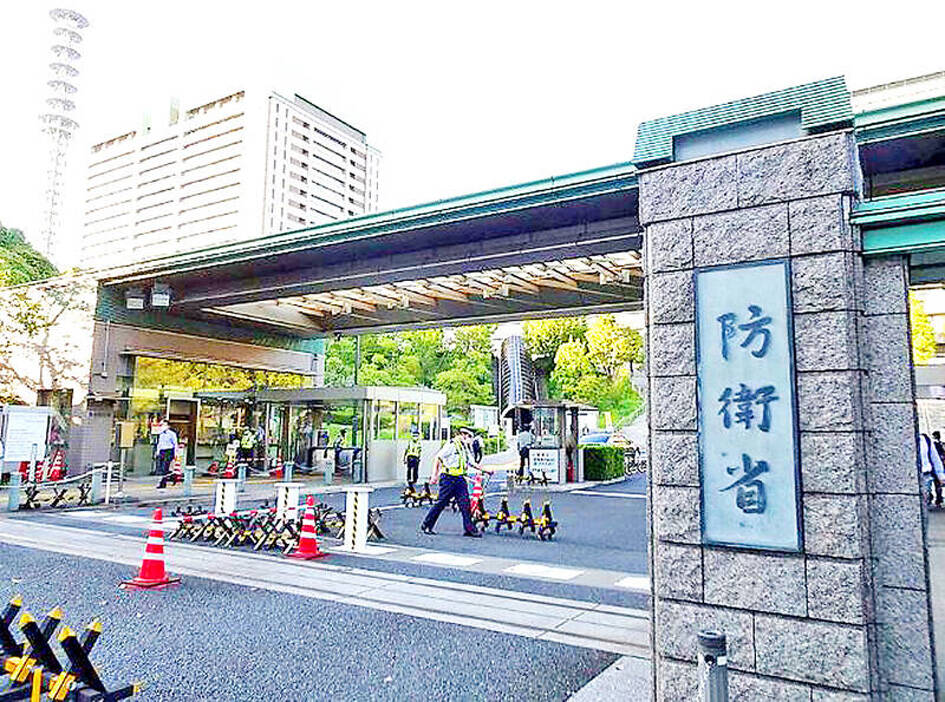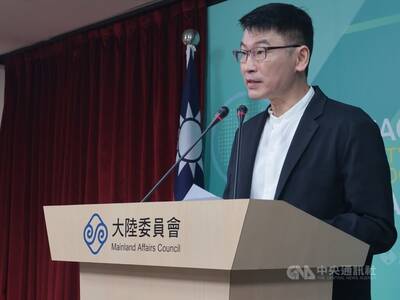Japan has been stepping up military deployments in the west of the country and on islands off its southwest coast due to the increased military threats from China, the Institute for National Defense and Security Research said in a report published on Wednesday last week.
The report, titled The Indo-Pacific Regional Security Situation Assessment Report in 2024, discussed the results of the elections in the Indo-Pacific region last year and how they could affect the region.
One of the chapters in the report, written by the institute’s assistant research fellow Wang Tsuen-yen (王尊彥), analyzes Japan’s “perimeter defense policy” and its approach to public opinion in the northeast Asian nation.

Photo: CNA
“Japan has clearly indicated in both its National Security Strategy and Defense White Paper that its security environment is rapidly deteriorating, with the largest threat coming from China,” Wang wrote.
Wang listed Japan’s military deployment on the islands off its southwest coast from October 2023 to September last year. Tokyo has added a 40-person electronic warfare squad on Yonaguni island and expanded its military base on the island to accommodate a soon-to-be-deployed air defense force.
A surface-to-ship missile unit was also installed on Okinawa Island, as well as an alarm radar to monitor the ships passing through the Miyako Strait, he said.
Japan’s National Defense Strategy said that its long-distance defense capabilities must be “fundamentally bolstered,” he said.
Japan obtained land-based “enhanced Type 12 surface-to-ship missiles” and Tomahawk missiles a year ago and test-fired “high-speed missiles for island defense” to attack enemy ships invading Japan’s outlying islands, he said.
Tokyo’s defense budget plan has allocated funds to build a medium-size transport ship, a small transport ship and motorboats, he said.
The funding would also cover expenses to rent eight ships from the private sector, he said.
Japan has also built 130 ammunition depots and designated 28 airports and seaports to be ready to accommodate military facilities, with most of them being in the west of the country, Wang said.
The Japanese government last year published a new guidebook to build shelters and organize drills, he said.
The Japan Coast Guard has allocated a budget to build a 30,000-tonne patrol ship in case a mass evacuation of people is necessary, Wang said.
A survey conducted by the Japanese Ministry of Foreign Affairs in April last year showed that 58.4 percent of Japanese think Tokyo should respond forcefully to foreign ships intruding in the country’s territorial waters, while 41.4 percent said that the Japanese government should ensure peace and stability of the region and international community, Wang said.
Japanese newspaper the Yomiuri Shimbun also published results of an opinion poll in April last year, showing that 53 percent of the respondents agreed that Japan’s defense budget should be increased, Wang said.
In related news, the Ministry of National Defense yesterday said it is using various strategies to prevent voluntary military recruits from quitting.
The number of voluntarily enlisted personnel dropped to 150,000 as of June last year from 160,000 in 2021, the lowest since 2018.
The ministry attributed the decline to the country’s low birthrate and corporate job offers.
The ministry said it is working on increasing incentives for military personnel to remain in post, such as by ensuring better treatment, adjusting enlistment requirements and raising salaries.

ENDORSING TAIWAN: Honduran presidential candidate Nasry Afura said that Honduras was ‘100 times better off’ when it was allied with Taipei The Ministry of Foreign Affairs yesterday said it would explore the possibility of restoring diplomatic relations with Honduras based on the principle of maintaining national interests and dignity. The ministry made the remarks in response to reporters’ questions regarding an article titled: “Will Taiwan Regain a Diplomatic Ally?” published in The Diplomat on Saturday. The article said Honduras’ presidential election in November could offer Taiwan the chance to regain an ally, as multiple candidates have promoted re-establishing diplomatic relations with Taiwan. Honduras severed diplomatic ties with Taiwan in March 2023 in favor of Beijing, but since switching its diplomatic recognition,

A fourth public debate was held today about restarting the recently decommissioned Ma-anshan Nuclear Power Plant, ahead of a referendum on the controversial issue to be held in less than two weeks. A referendum on Aug. 23 is to ask voters if they agree that “the Ma-anshan Nuclear Power Plant should continue operations upon approval by the competent authority and confirmation that there are no safety concerns.” Anyone over 18 years of age can vote in the referendum. The vote comes just three months after its final reactor shut down, officially making Taiwan nuclear-free. Taiwan People’s Party Chairman Huang Kuo-chang (黃國昌) represented

Scoot announced yesterday that starting in October, it would increase flights between Taipei and Japan’s Narita airport and Hokkaido, and between Singapore and Taipei. The low-cost airline, a subsidiary of Singapore Airlines, also said it would launch flights to Chiang Rai in Thailand, Okinawa and Tokyo’s Haneda airport between December and March next year. Flights between Singapore and Chiang Rai would begin on Jan. 1, with five flights per week operated by an Embraer E190-E2 aircraft, Scoot said. Flights between Singapore and Okinawa would begin on Dec. 15, with three flights per week operated by Airbus A320 aircraft, the airline said. Services between Singapore

The Mainland Affairs Council (MAC) yesterday announced a ban on all current and former government officials from traveling to China to attend a military parade on Sept. 3, which Beijing is to hold to mark the 80th anniversary of the end of the Second Sino-Japanese War. "This year marks the 80th anniversary of the end of World War II and the Republic of China’s victory in the War of Resistance [Against Japan]," MAC Deputy Minister and spokesperson Liang Wen-chieh (梁文傑) told a regular news briefing in Taipei. To prevent Beijing from using the Sept. 3 military parade and related events for "united